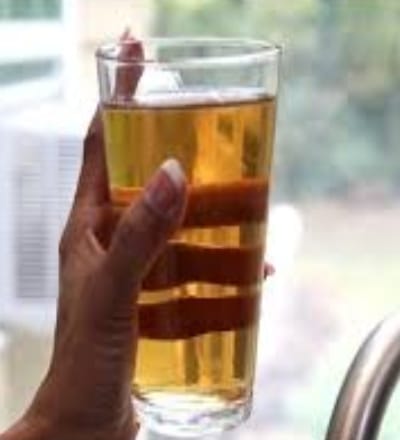We like to share product recommendations with you and hope you like them! Just to make you aware Water Filter Data may collect a small share of sales or other compensation from the links on this page.
Why is my water yellow? I don’t know about you, but if I turned on the faucet only to find yellow water, that is the question I would be asking!
While it sounds bad, yellow tap water is usually a sign of some rust in your water. Tap water is filled with minerals and some contaminants. Things like rust, iron, and oxygen can seep into our water in small amounts. In combination, these things will create yellow tap water. There are also contaminants that will turn well water yellow and filtration is required to help with this.
Yellow water from the tap might seem overwhelming. Most people are used to crisp, clear water and anything different is concerning. While it’s right to be concerned if your water is anything less than normal looking, yellow water from tap isn’t always a serious health concern. More importantly, there are things you can do to fix it! Keep reading to learn more about yellow water and how to get rid of it!
Why is My Water Yellow?
Whether you have yellow water or it’s another color like red or orange, the color tends to signify rust contamination. While this sounds serious, health issues as a result of rust contamination are relatively rare. Still, no one wants rust in their water.
The yellow color might not be a problem, but it could lead to one. Lines are flushed to ensure problems like yellow water don’t often occur. When the lines are flushed it releases built-up sediment. The sediment can remain in the pipes and even latch on to the walls of your pipes. If this happens your pipes can degrade, and your pipes could leak or even fail altogether.
In many cases, though, the rust doesn’t come from the homeowner’s pipes. The water distribution infrastructure in the United States is terribly outdated, and in many cities, pipes put in the ground back in World War II are still being used. As a result, some distribution pipes are rusty and in need of replacement.
Most pipes used in cities were made from iron until about 30 years ago, according to Reuters. These pipes corrode over time, leading to rust getting in your drinking water.
Here are a few other reasons for yellow tap water:
A New Source of Water
Change in water due to a new water source or a reservoir might affect the water quality. Experts believe that a shift in the source was to blame for both the present lead problem in Flint and a comparable incident in Washington, D.C. in the early 2000s.
The switch can change the properties of the water or impede its flow, affecting the appearance, taste, odor, and overall quality of your water.
Rusty Water Heater
Another component of your home’s plumbing that might rust is your water heater. A rusted water heater may spill a tiny quantity of rust into your hot water supply, turning it yellow, orange, or brown.
There’s an easy technique to tell if your water is yellow due to a rusted heater. Turn on both the hot and cold water faucets at the same time. If the color of your hot water is tainted, you know it’s most likely due to a problem with your heater.
Corroded Household Piping
If you have discolored water that clears up after a few minutes, you likely have rusted pipes or fittings in your home plumbing. Similarly, if you only get discolored water from a few taps, it’s doubtful that your water supply is the source of the problem.
The Fire Department
Your fire department may need to use a hydrant on the roadway on rare occasions. Large volumes of water drawn by emergency services can cause pressure fluctuations in the system, which can mix up sediments and cause discoloration in water supplies.
Burst Pipes
Burst pipes can occur due to physical damage or corrosion, causing rapid changes in watercolor and perhaps a reduction in water pressure. When pipes burst, sediments and pollutants from the environment may enter your water supply.
A burst pipe problem is generally detected promptly by your local government, and it’s usually resolved within hours. If you have a leak or a broken pipe serving your own home, you’ll need to hire a plumber because you’ll be responsible for the repairs.
Is Yellow Water Safe to Use and Drink?
Technically, yellow tap water is usually safe. You can use it as you would regular water and likely be okay. But let’s be honest, no one wants to drink yellow water with traces of rust in it.
If the color is bothersome, a water filter may be able to help remove the color and other impurities. Even if yellow tap water can be used, you’ll want to determine the source of the problem making your water yellow. The color of the water can mean that you have a plumbing problem, which could get worse if it goes untreated.
The presence of bacteria, iron and manganese, organic debris, and rust in your water during routine maintenance doesn’t indicate that your health is at risk. Bathing with yellow water is safe since the human body quickly absorbs iron.
Long-term exposure to high-mineral-content water, on the other hand, can cause skin, hair, and scalp issues. Constant contact with water with high mineral content might cause your skin to become dry. It can also cause dry hair and an itchy scalp. You can treat the skin, hair, and scalp dryness by removing the mineral content.
If the iron in your faucets has a tint or oxidizes while running, it can ruin your clothes and even light-colored dishes. These aren’t just ordinary discolorations. Clothing that has been washed in iron-contaminated water can discolor, especially lighter-colored clothing.
Even if your washing machine is in good working order, this discoloration can turn into permanent, uneven staining, causing iron in your water to damage your clothes.

How Can I Get Rid of my Yellow Water?
First, you need to find out what’s causing your yellow water. If the problem is your water supply, the only likely solution will be the addition of a water filter. However, you should call a plumber to find out where the problem is coming from and what can be done to fix it if it’s an issue with some affected pipes.
In the meantime, a water filter will help to clear up your yellow water. If you’re worried about contaminants, a filter will also reduce or remove the contaminants in your water. Filters don’t have to be hard to use or expensive. In fact, they are usually quite the opposite.
If you notice yellow water coming from every faucet, you can get a whole-house water filter for a reasonable price. The DuPont WFPF13003B won’t break the bank and it will help to clean up your water of weird colors and/or tastes.
There are also countertop filters (Home Master TMJRF2), under the sink filters (Filtrete Advanced), or even simple water filter pitchers (Aqua Gear) that you can get to remove the impurities from your water.
Yellow water isn’t the end of the world, but it is something you should have checked out to ensure that future problems don’t arise. If you have any other water questions, remember, we’re here to help!
FAQ
What does yellow water mean?
Typically means there is some contamination from the pipes that provide the water to your house via corrosion and rust.
Is yellow water safe to drink?
Yes, for the most part it will not cause any harm to drink but having a water filter system would be beneficial.
Can yellow water make you sick?
The yellow color in the water should not have significant effects on the human body so should be safe to use without getting you sick however a water filter system is suggested.
Summary
Having yellow water in your home is not a huge cause of concern but definitely best to have things checked out to make sure there are no piping issues such as rust as this may lead to plumbing issues in the future. If it turns out to be a city issue then the best option would be to have a water filtration system that can remove the sediment from the water, may not change the colour all the way to clear but should make it safer to drink and use on a daily basis.

Ph.D. graduate working as a water quality consultant for many government agencies helping them find solutions to the ever-growing problem of polluted water. Loves a good coffee!







